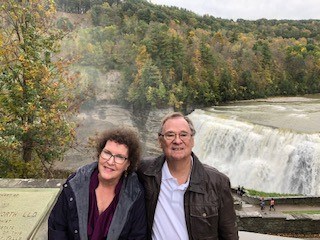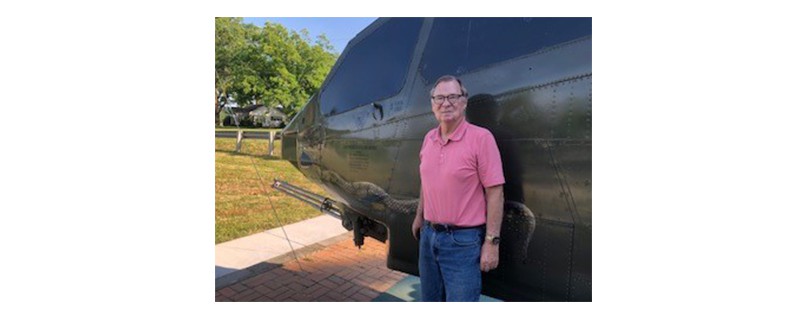Diamondhead Man Beats 3 Types of Cancer with UAMS’ ‘World-Class Care’
| Larry Seals doesn’t back down from a challenge.
As a highly decorated helicopter pilot in the Vietnam War, Seals saw more than his share of conflict and hardship. But through it all, he never lost his sense of humor or positive attitude.
“Hope is a wonderful thing. I think it helps us stay positive and make the best choices we can make in difficult times,” said Seals, of Diamondhead.
Little did he know, he would need that positivity years later to help him to fight — and beat — three different types of cancer.
After Seals’ Army career ended, he continued his love of flying by getting certified as a fixed-wing pilot, meaning he could fly and navigate airplanes, helicopters and other aircraft.
He and his wife, Sharon, have two children, and Seals wanted them to experience the joy of flying and learn some of the science related to it, as well.
To keep up his certification, Seals was required to undergo annual physicals. It was during his 2008 exam when the doctor discovered prostate cancer.
“I let the VA know I was diagnosed with cancer, and they confirmed it was result of exposure to Agent Orange during my years in Vietnam,” Seals said.
Soon after his initial diagnosis, a CT scan revealed enlarged lymph nodes in his belly, leading to a second diagnosis of low-grade follicular non-Hodgkin lymphoma.
While he was successfully treated with radiation therapy for the prostate cancer, no treatment was recommended at that time for the lymphoma, which was slow-growing and not causing him any pain or other symptoms.
“With low-grade non-Hodgkin lymphoma, we often simply observe and monitor the patient with routine scans and examinations. When symptoms start to appear, that’s when we need to take action,” said Appalanaidu Sasapu, M.D., hematologist oncologist at the UAMS Winthrop P. Rockefeller Cancer Institute. Sasapu also is an assistant professor in the UAMS College of Medicine Department of Internal Medicine.

Larry Seals’ family, including wife Sharon, was a strong support network during his cancer treatment.
Two years passed with no unusual symptoms, until, in 2010, Seals began to experience dizziness and headaches. A UAMS physician ordered an MRI, which yielded an unexpected result: His lymphoma had spread to the meningeal fluid that surrounds the brain.
“It was shocking and devastating to discover his lymphoma had spread to the brain,” Sasapu said.
Treatment options were difficult for this type of cancer and included high-dose chemotherapy directly to the brain and spinal canal.
“It was tough,” Seals said, adding that as a result he now lives with what is called post-chemotherapy cognitive impairment, which causes a decreased ability to recall short-term memories and form new memories.
“This therapy was not easy for him, but he had great support from his family and very strong willpower. As a veteran, he had already fought for his country. With this difficult treatment, he had to fight for himself,” Sasapu said.
Even with all of the challenges he faced, Seals pulled through and made it to remission, a milestone he’ll never forget.
“It’s so important to get the best medical attention possible, and we were blessed to be in central Arkansas with the great doctors and research available at UAMS,” Seals said.
For six years, Seals remained in remission, with no symptoms or recurrence of his disease. Then, in 2016, he began to have abdominal discomfort.
“He came to see me and I advised that he undergo a biopsy. Unfortunately, one type of lymphoma can sometimes transform into a different type, and that’s exactly what we found with Mr. Seals,” Sasapu said.
When the biopsy results came back, they showed that his follicular non-Hodgkin lymphoma had transformed into a more aggressive type of the disease known as diffuse large B-cell lymphoma.
Determined to restore his health once again, Sasapu devised a treatment plan designed to put Seals back into long-term remission or cure him of the lymphoma.
“I had to consider his age, his other health conditions and his previous chemotherapy side effects to develop a regimen that was tolerable for him,” Sasapu said.
After four rounds of the new chemotherapy, Seals was in remission once again. But since the lymphoma had already recurred twice, Sasapu was not satisfied that he had done enough to ensure Seals as many years as possible with his family.
That’s when he recommended Seals undergo an autologous stem cell transplant. This type of transplant involves removing a person’s own stem cells and then replacing them back into the blood stream, where they start producing new, healthy blood cells.
The transplant required a three-week hospital stay with five days of high-dose chemotherapy designed to kill his bone marrow and any residual lymphoma. After his stem cells were replaced and the healthy cells started to multiply, Seals’ recovery began.
“Mr. Seals’ transplant was about four years ago. I recently did a CT scan to look at his disease status, and he is in complete remission. He did it, and we did it for him,” Sasapu said.
Seals is now back to enjoying his family and the activities he loves. But his experience of being treated for three types of cancer is never far from his mind.
“One of the things about being diagnosed with cancer are the negative thoughts that go along with that. It’s hard, but you’ve got to keep a positive attitude and move forward with the goal that there is hope out there. I found hope at the UAMS Cancer Institute, and we couldn’t have asked for more,” Seals said.
